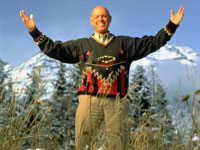Staying Fit
Editor's note: Best-selling author and motivational speaker Stephen Covey, 79, died July 16 of complications from a bicycle accident in April. This interview from April is one of his last.
Stephen Covey, known worldwide for his novel ideas about leadership and problem solving, starts any one-on-one conversation with these words: “How are you?”
Covey listens intently to your response. Then he asks about your family, your work, your life. It’s startlingly deferential behavior for someone named one of Time magazine’s “25 most influential Americans.”


AARP Membership— $12 for your first year when you sign up for Automatic Renewal
Get instant access to members-only products and hundreds of discounts, a free second membership, and a subscription to AARP the Magazine.
It’s also vintage Covey. Now in his 80th year, the Utah-based author (The 7 Habits of Highly Effective People) not only practices empathy but preaches it: “When you show deep empathy toward others,” he says, “their defensive energy goes down, and positive energy replaces it. That’s when you can get more creative in solving problems.”


Covey’s latest book, The 3rd Alternative: Solving Life’s Most Difficult Problems, explains how this creativity can enable two parties at odds to fashion something better than either one had imagined: “It’s not a compromise. It’s different in kind.”
Covey is still writing, though he’s cut back on traveling to spend more time with his wife, Sandra (to say nothing of their nine children, 52 grandchildren and seven great-grandchildren). He recently shared his wisdom on staying connected with others and finding one’s greatest worth in the second stage of life.
A. It means communicating other people’s worth and potential — the gifts and talents they have — so clearly to them that they see it in themselves.
Q. You recommend avoiding comparisons between people.
A. Yeah, that can nurture a “scarcity mentality” — the idea that because one person gets a piece of the pie, there’s less for everyone else. Instead, I have an “abundance mentality”: When people are genuinely happy at the successes of others, the pie gets larger.

































































More From AARP
Sheila Johnson Details Her Business Triumphs and Personal Betrayals in ‘Walk Through Fire’
America’s first Black female billionaire, 74, discusses her painful marriage, remarkable career and new memoir with AARP
9 Essentials for a Happier Life, According to Oprah Winfrey
Her new book ‘Build the Life You Want’ with Arthur C. Brooks offers an action plan for ‘happierness’
Romances for People in Their 50s? Author Jane Porter Says, ‘Why Not?’
The author, 59, of ‘Flirting With Fifty’ wants to encourage women to ‘live big, juicy lives’ as they age